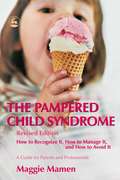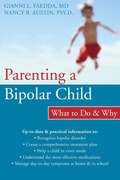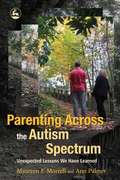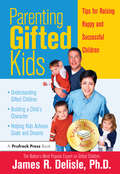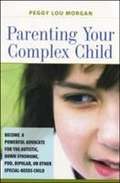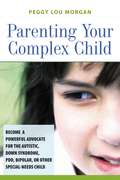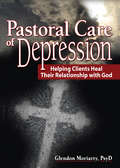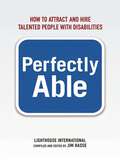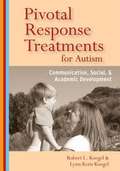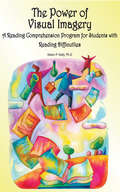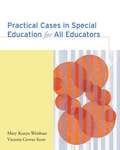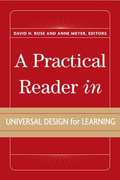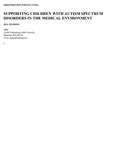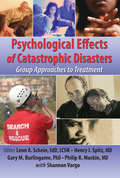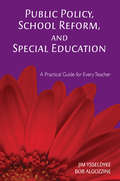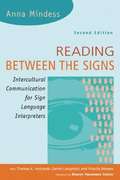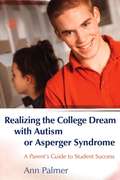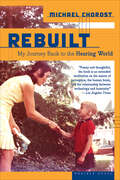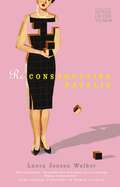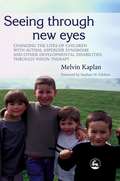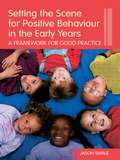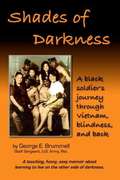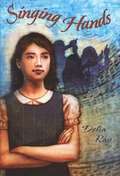- Table View
- List View
The Pampered Child Syndrome: How to Recognize it, How to Manage it, and How to Avoid it – A Guide for Parents and Professionals
by Maggie MamenThe Pampered Child Syndrome is a welcome source of advice for parents or professionals working with children who are given all the love and care they need, yet who remain unhappy, anxious or angry. This book argues that we live in a society where real progress has been made in the development of child-centered parenting, education and care, but that this cultural shift has produced a generation of children who are entitled to the same rights as adults but not ready to accept grown-up responsibilities - children who are 'loved too much'. Dr. Maggie Mamen describes common characteristics of the pampered child, and offers practical advice on how to strike an effective balance between caring for and nurturing children while at the same time maintaining authority and respect. The Pampered Child Syndrome also tackles the difficult issue of child mental health. Drawing on her professional expertise as a clinical psychologist, Dr. Maggie Mamen outlines how the 'symptoms' of the pampered child can be similar to those used to diagnose many common emotional, behavioral, and psychiatric disorders. She flags up the danger of misdiagnosis and asserts the critical importance of maintaining a distinction, offering clear guidance on identifying genuine disorders. This book will offer valuable support and encouragement to parents, teachers, and health and social care professionals who want to raise children who are confident, happy, healthy, and socially aware.
Parenting a Bipolar Child: What To Do And Why
by Gianni Faedda Nancy AustinTwo preeminent researchers and clinicians specializing in the treatment of child-onset bipolar disorder offer the first and only step-by-step guide for parents, a comprehensive approach to helping a child with bipolar disorder by integrating professional medical treatment with behavior regulation, problem solving, positive reinforcement, and limit setting techniques.
Parenting Across the Autism Spectrum: Unexpected Lessons We Have Learned
by Ann Palmer Maureen MorrellMaureen F. Morrell and Ann Palmer are raising two very different children: Justin, a whirlwind of activity and mood swings, who is supervised in a residential farm community, and Eric, quiet and passive, who lives independently at college. The authors give an account of the striking similarities as well as the stark differences in their experiences of parenting children at opposite extremes of the autism spectrum. The two mothers speak openly about their children's diagnosis and early childhood through to adolescence, young adulthood and the day they leave home. They give a moving account of the challenges they faced and the surprising consolations they found along their sons' very different paths in life. Through their friendship and two decades of shared experiences of parenting an ASD child, each has gained a clear understanding of her own strengths and limitations, as well as those of her child. Parenting Across the Autism Spectrum offers a personal perspective and practical guidance for parents at the start of their journey with autism, especially those whose children are newly diagnosed. It also provides useful insights for professionals working with individuals across the autism spectrum and their families. The book was elected the 2007 Autism Society of America's Outstanding Literary Work of the Year.
Parenting Gifted Kids: Tips for Raising Happy and Successful Children
by James DelisleA gifted education Legacy Award winner, Parenting Gifted Kids: Tips for Raising Happy and Successful Children provides a humorous, engaging, and encouraging look at raising gifted children today. James R. Delisle, Ph.D., offers practical, down-to-earth advice that will cause parents to reexamine the ways they perceive and relate to their children.Dr. Delisle puts forward 10 tips to parents of gifted children—ideas that reflect attitude and approach and allow for introspection and change, rather than quick, do-it-tonight solutions. Some topics of interest include understanding a child's giftedness, working with the school system, dealing with perfectionism in gifted kids, and being adult role models for children. Along the way, stories from gifted children and their parents provide insight into the lives of these individuals.What sets this book apart from other books for parents of gifted kids is its expansion beyond mere platitudes. Dr. Delisle's tips go beyond the basics, focusing on attitude, reflection, and subtle changes, rather than specific, cookie-cutter recipes for action. The 10 tips suggested and expanded upon in this book include: understanding what giftedness is . . . and what it is not; understanding the differences between gifted kids and their agemates; understanding the personality traits of gifted kids, including overexcitabilities; taking charge of your child's education; understanding the issue of perfectionism in gifted kids; examining social nuances and myths related to giftedness; examining the similarities parents share with their gifted children; setting reasonable goals; helping gifted children make a difference in the lives of others; and remembering that gifted children are kids first and gifted second.Educational Resource
Parenting Your Complex Child: Become a Powerful Advocate for the Autistic, Down Syndrome, PDD, Bipolar, or Other Special Needs Child
by Peggy Lou MorganMorgan describes ways to parent children with special needs, particularly in communication, adaptation, and communicating with those who can help. She first recounts her experiences with her son, who is multiply disabled, then provides suggestions for working with doctors, tracking day-to-day behavior, schedules and routines, documentation, using service dogs, getting professionals to listen, creating a community, and hiring caregivers. The appendix consists of sample forms and lists. The book is aimed at parents of children with behavior disorders, developmental problems, autism, Down syndrome, bipolar disorder, schizophrenia, ADHD, pervasive development disorder, and others. There is no bibliography. Morgan has worked extensively with special-needs children and their families.
Parenting Your Complex Child: Become a Powerful Advocate for the Autistic, Down Syndrome, PDD, Bipolar, or Other Special-Needs Child
by Peggy MorganBesides the usual parenting challenges, parents of disabled children face added obstacles that can tax the resolve and resources of even the strongest families. Peggy Lou Morgan has developed a powerful system for obtaining dramatically better care for children with one or more serious disabilities. Parenting Your Complex Child reflects the experience and knowledge she has gained through decades of navigating a sea of complex medical, educational, occupational, and social issues while working with disabled clients and with her own son. Morgan's unique tracking and documentation tools let parents adapt to their child's challenges, create routines that support the child's needs, communicate those needs to busy professionals -- and be taken seriously by them. The book also helps parents lay the groundwork for care to continue after they themselves can no longer provide it. Compassionate, practical, and proven, Parenting Your Complex Child helps parents ensure that life-changing decisions are based on the best interests of the child -- and on the best information available.
Pastoral Care of Depression: Helping Clients Heal Their Relationship with God
by Glendon MoriartyThis book provides the essential tools needed to transform negative God images in depressed clients! Pastoral Care of Depression: Helping Clients Heal Their Relationship with God is designed to help clergy and mental health professionals understand how depression negatively affects the way people emotionally experience God and how, through therapy, this hurtful God image can be changed into a much more positive one focused on healing.In the past, the God image (as well as the essential differentiation between God image and God concept) has been explained in dull, analytic terms that are difficult to understand. This book&’s jargon-free language and engaging presentation make it an effective learning tool for students and professionals alike. Inside, you&’ll find numerous psychological tests, complete with sample test forms, that identify the God image. These are clearly explained and include all the information needed to take, administer, and interpret them. Pastoral Care of Depression teaches you to use psychodynamic and cognitive interventions to change a client&’s God image, including foundational knowledge and clearly presented techniques to implement in the therapeutic relationship. This comprehensive treatment manual arms you with the most comprehensive array of cognitive interventions published to date, with tens of easy-to-follow techniques designed to tap directly into an individual&’s subjective experience of God. Two appendixes give you a sample God Image Automatic Thought Record and Treatment Plan form.Part I: Depression and the God Image examines: the nature and development of depression symptoms of depression specific to religious people defining a client&’s image of God, how it developed, and what it reveals the relationship between self, depression, and God image, and how God images relate to Christian thoughtPart II: Changing the God Image addresses: the importance of self-evaluation for therapists and counselors-and how to do it the nature of the therapeutic relationship counseling skills that strengthen the therapeutic relationship how to conduct an God Image Assessment Interview and how to work with what that interview reveals transference, countertransference, cyclical maladaptive patterns, and internalization in psychodynamic psychotherapy appropriate, effective psychodynamic interventions the essentials of cognitive therapy and how it can be utilized to positively affect the God image treatment planning and case conceptualization important ethical issues for considerationWith well-designed test and exercise forms and clear instructions on their use and interpretation, Pastoral Care of Depression provides the essential tools needed to work effectively with this important client group. Make it a part of your professional/teaching collection today!
Perfectly Able: How to Attract and Hire Talented People with Disabilities
by Jim HasseMore than 22 million of the almost 173 million working-age individuals in the United States have one or more disabilities. Perfectly Ableoffers practical guidance for companies large and small on how to hire and retain talented and motivated people from within this largely untapped pool of potential employees. Illustrated with enlightening personal stories, this one-of-a-kind book provides insight into what it's like to seek employment as an individual with a disability. Readers will discover how to: * Evaluate how suited their workplace environment is for disabled or different employees and what needs to be changed * Improve and sustain their workforce by hiring the best people, regardless of any disability or diversity issue * Effectively recruit, place, and develop individuals with disabilities who can contribute to their company's success * Embrace the differences among their workforce to add value to the organization
Pivotal Response Treatment For Autism: Communication, Social, And Academic Development
by Robert L. Koegel Lynn Kern KoegelDiscover how to use natural learning opportunities to target and modify key behaviors in children with autism, leading to widespread positive effects on communication, behavior, and social skills. It's all possible with the innovative, widely used Pivotal Response Treatment (PRT), an empirically supported treatment for autism recognized by the National Professional Development Center on Autism Spectrum Disorders and the National Standards Project. <p><p> Because PRT works with each child's natural motivations and stresses functional communication over rote learning, this comprehensive model helps children develop skills they can really use. With this timely resource, educators and therapists will support children with autism as they enjoy more positive interactions, more effective communication, and higher academic achievement in natural, inclusive settings.
The Power of Visual Imagery: A Reading Comprehension Program for Students with Reading Difficulties
by Karen Patricia KellyFormerly published by Peytral PublicationsThis user-friendly resource provides the theory for improving students' reading skills through visual imagery, plus actual lesson plans to use independently or alongside your language arts program.
Practical Cases in Special Education for All Educators
by Mary Konya Weishaar Victoria Groves ScottPractical Cases in Special Education for all Educators focuses in on how general educators can and should become active participants in the education of children who have disabilities, by providing students with much needed practical applications of how general and special educators must work together and become involved in the education of all children.
A Practical Reader in Universal Design for Learning
by David H. Rose Anne MeyerUniversal Design for Learning (UDL) stands at the forefront of contemporary efforts to create universal access to educational curricula for all students, including those with disabilities. The universal in UDL does not mean there is a single optimal solution for everyone.
Prescription for Success: Supporting Children With Autism Spectrum Disorders in the Medical Environment
by Jill HudsonBecause of the unique needs of children with ASD, it is important to pay special attention to the details of their experience in the medical environment. Designed to help make the medical experience easier for all involved, this book presents information on ASD, the varying developmental levels, interventions, and assessments that medical staff, parents, educators, and key service providers can use to more effectively interact with and support children with ASD while in the medical setting.
Psychological Effects of Catastrophic Disasters: Group Approaches to Treatment
by Joseph Rose Henry I Spitz Leon Schein Gary Burlingame Philip R. MuskinA thorough, user-friendly guide of basic knowledge and group interventions for psychological trauma from terrorist attacks and other catastrophic disastersThere is relatively little literature on the psychological trauma caused by catastrophic disasters, including terrorist attacks and the impending threats of terrorism. Psychological Effects of Catastrophic Disasters: Group Approaches to Treatment fills that gap by comprehensively discussing ways to minimize the psychological damage resulting from catastrophic disasters as well as the trauma developed from the threat of future terrorist attacks. The book provides thorough presentations of almost manualized group methods for the prevention and treatment of the acute and longer-term psychological effects for children, adolescents, and adults.Appropriate treatment immediately after a catastrophe can diminish harmful psychological effects, enhance an individual&’s quality of life, decrease psychosomatic illnesses and the exacerbation of chronic medical conditions, increase the effective utilization of medical facilities, and decrease medical expenses. In this book, internationally renowned authorities provide practical expert suggestions and helpful examples to illustrate the interventions and provide a quick reference for professionals facing the aftermath of prospective terrorist disasters and other catastrophic events. Psychological Effects of Catastrophic Disasters: Group Approaches to Treatment is divided into four sections. The first section provides an overview of the book; the second discusses the foundations and broad issues which potentially affect the outcome of group treatment; the third section presents group models which address the particular needs of children, adolescents, parents, emergency service personnel, and mental health practitioners; and the fourth part considers future directions of treatment. Designed to be used as a comprehensive single source for professionals working with victims of trauma caused by terrorism or catastrophic disaster, this book can be read and used in its entirety, or specific chapters detailing treatments can be chosen and used independently as needed. Extensive references allow opportunities for further research.Psychological Effects of Catastrophic Disasters: Group Approaches to Treatment presents unique first-person accounts of September 11th and examines: the neurobiological effects of a traumatic disaster the effective use of psychotropic medication the implications of living with ongoing terrorist threats a new framework for preparedness and response to disasters and trauma for children and families cultural, religious, and ethnic differences related to the prevention and treatment of psychological sequelae the diagnosis and treatment of traumatic grief retraumatization, distressing reminders, and their effects on post-traumatic adjustment the knowledge trauma therapists need to integrate small group principles the diagnosis and group treatment of acute and long-term effects with adults and children the use of spiritual principles after a terrorist disaster or catastrophic event nine types of groups appropriate for specific populationsPsychological Effects of Catastrophic Disasters: Group Approaches to Treatment is a timely, comprehensive reference for social workers, psychologists, psychiatrists, health professionals, mental health professionals, educators, and students.The royalties from this book shall be donated to organizations which provide direct services to those who continue to be affected by the events of September 11th, 2001 and Hurricane Katrina (August 29th, 2005).
Public Policy, School Reform, and Special Education: A Practical Guide for Every Teacher
by Bob Algozzine Dr James E. YsseldykeCase studies illustrate how social, political, and economic factors affect special education practices and the distribution of limited resources to students with special needs.
Reading Between The Signs: Intercultural Communication for Sign Language Interpreters
by Anna Mindess Thomas K. Holcomb Daniel Langholtz Priscilla Moyers Sharon Neumann SolowIn Reading Between the Signs: Intercultural Communication for Sign Language Interpreters, Anna Mindess provides a new perspective on a unique culture that is not widely understood-American Deaf culture. With the collaboration of three distinguished deaf consultants, Mindess explores the implications of cultural differences at the intersection of the deaf and hearing worlds. The book takes a practical approach with many useful suggestions for the sign language interpreter. Mindess provides several helpful dialogues between hearing and deaf Americans in a variety of situations to illustrate the problems that can arise as a result of cultural differences. The compounded difficulty of communicating with a deaf person from another country is addressed as well, with suggestions for ameliorating possible areas of misunderstanding. It also provides helpful information about advances in technology and the multicultural communities within the Deaf world. Reading Between the Signs is an invaluable tool for those interested in training as a sign language interpreter, but further, for anyone wishing to understand American Deaf culture. . A dazzling application of the tools of intercultural communication to illuminating Deaf and hearing cultures and their differences. . This is a book for everyone interested in Deaf culture. -Harlan Lane, author of When the Mind Hears and The Mask of Benevolence Adds a necessary dimension to understanding what sign language interpretation really entails-not the exchange of words for signs and vice versa but the translation of one view of life and all its meanings into another equally valid yet different view -William C. Stokoe, Former Professor Emeritus, Gallaudet University BRAVO The book is outstanding - well written, informative, and desperately needed in our field . -Jan Humphrey, Ed. D. Certified Interpreter, Interpreter Educator and Author of So You Want to Be an Interpreter?A must-read An enlightening book. a defining document in the literature of Deaf culture. -Eileen Forestal, Professor, ASL Studies and Interpreting Training, Union County College Contents Foreword by Sharon Neumann So low Preface Acknowledgments Part One: Background 1 Introduction 2 The Study of Culture 3 Selected Topics in Intercultural Communication 4 Do Americans Really Have a Culture? 5 American Deaf Culture 6 Multicultural Deaf Culture 7 Culture, Change, and Technology Part Two: Practical Applications 8 The Impact of Cultural Differences on Interpreting Situations 9 Multicultural Interpreting Challenges 10 The Interpreter's Role and Responsibilities 11 Techniques for Cultural Adjustments12 Interpreting in a Virtual World 13 Cultural Sensitivity Shouldn't End at Five O'Clock Afterword by Dr. Thomas K. Holcomb Bibliography About the Author and Contributors Index.
Realizing the College Dream with Autism or Asperger Syndrome: A Parent's Guide to Student Success
by Ann PalmerRealizing the College Dream with Autism or Asperger Syndrome is both a practical and a personal account of one ASD student's successful experience of going to college. This accessible book focuses on how to get there and stay there: deciding to go, how to get in and how to get the most out of it. Ann Palmer advises parents and professionals how to prepare the student for the transition from school and home life to a new environment and educational challenge, and how to support them through potential problems such as academic pressure, living away from home, social integration and appropriate levels of participation in college. She offers helpful strategies that will encourage and inspire parents and students and show that college can be a suitable option for students with an autism spectrum disorder, as well as the basis for a successful independent life later. This book is essential reading for any parent considering college as an option for their child, disability service providers in colleges and for ASD students themselves.
Rebuilt: My Journey Back to the Hearing World
by Michael ChorostAfter Michael Chorost suddenly lost what was left of his hearing, he took the radical step of having a cochlear implant -- a tiny computer -- installed in his head. A technological marvel, the device not only restored to him the world of sound but also could be routinely upgraded with new software. Despite his intitial fear of the technology's potentially dehumanizing effects, Chorost's implant allowed him to connect with others in surprising ways: as a cyborg, he learned about love, joined a writing group, and formed deeper friendships. More profoundly, his perception of the world around him was dramatically altered. Brimming with insight and written with charm and self-deprecating humor, Rebuilt unveils, in personal terms, the astounding possibilities of a new technological age.
Reconstructing Natalie (Women Of Faith Ser.)
by Laura Jensen WalkerNatalie faces breast cancer with her friends, humor, girlfriends, and is a survivor. This is a story full of laughter, tears, hope and humor....<P><P> Natalie Moore is having a great time living her life until she confronts something that too many women fight in today's society: breast cancer. At twenty-seven years old, Natalie walks us through the emotions and reality of having breast cancer while she loses her boyfriend, her fair, and both of her breasts. She also shows us how to cope, as she makes new friends, gets reconstructive surgery that even enhances her figure, finds new love in unexpected places, and makes major changes in her life. Natalie learns to place importance in people in attributes other than the obvious and physical as she works on reconstructing herself.
Reducing Barriers to Training of Blind Graduate Students in Psychology
by Heidi JoshiTo increase the number of psychologists with visual impairments, all levels of the pipeline, from graduate training through practica and internship, need to be accessible to this population. This study sought to determine the types of barriers students who are blind face in their psychology graduate programs. The areas explored in the study included accessing printed materials throughout participants' graduate process, administering and scoring test protocols, accessing sources for research, and obtaining campus-wide communications. Attitudinal barriers were also explored in this study, particularly from supervisors, instructors, and peers. There is very little research in this area and as a result, this study was designed to elucidate the experiences of participants with visual impairments in their graduate programs. One goal was to give training institutions a better understanding of the barriers faced by students who are blind. Nineteen participants were interviewed using a semi-structured questionnaire consisting of yes/no and open-ended questions. Descriptive statistics were utilized in order to obtain the major themes of the responses. The most universal barrier related to the plethora of printed material encountered in graduate training. Nearly all of the participants discussed difficulties in obtaining printed material in alternate formats. They especially found it difficult to get enough sources in a timely manner for their research. Participants discussed missing class changes or other important details due to this information being posted in print and not accessible to them. Attitudes were a second barrier frequently encountered. Participants stated that they had to contend with the prejudicial attitudes of supervisors, professors, and peers who were meant to assist them in their process. Participants also discussed their wish to have more disability related awareness and education activities implemented in the curriculum of their graduate institutions. This would assist these institutions in overcoming the attitudinal barriers experienced by their students who were blind. However, participants also discussed supportive factors such as partners and professors who would provide appropriate classroom accommodations. Despite the over thirty years since passage of the rehabilitation act, and the fourteen years since the implementation of the American with Disabilities Act. Results indicate that numerous barriers still exist for graduate psychology students who are blind. These barriers must be aggressively addressed for persons who are blind to be afforded equal access to training in psychology.
Secret Girl
by Molly Bruce JacobsAt age thirty-eight, newly sober Molly Bruce Jacobs meets Anne for the first time ever. Because of her mental impairments, Anne was institutionalized as a young child. As time goes by, and the sisters grow closer, Molly comes to understand, not only the reasons behind her alcoholism, but, also what led her parents to make the decision that would have such a profound effect on the lives of these two, very different sisters.
Seeing Through New Eyes: Changing the Lives of Children with Autism, Asperger Syndrome and other Developmental Disabilities Through Vision Therapy
by Melvin Kaplan Stephen M. EdelsonSeeing Through New Eyes offers an accessible introduction to the treatment of visual dysfunction, a significant but neglected problem associated with autism spectrum disorders (ASDs) and other developmental disabilities. Dr. Kaplan identifies common ASD symptoms such as hand-flapping, poor eye contact and tantrums as typical responses to the confusion caused by vision disorder. He also explains the effects of difficulties that people with autism experience with "ambient vision", including a lack of spatial awareness and trouble with coordination. Other chapters give guidance on how to identify the visual deficits of nonverbal children, select prism lenses that will alter the visual field, and create individually tailored programs of therapy in order to retrain the system. This book is essential reading for parents of children with ASDs, and professionals in the fields of autism, optometry and ophthalmology, psychology and education.
Setting the Scene for Positive Behaviour in the Early Years: A Framework for Good Practice
by Jason SwaleThis highly practical book shows how staff in early years settings can implement simple changes to make positive behaviour a reality for all. Based on his vast experience in the field, the author provides an array of positive behaviour strategies that can be successful with the widest variety of children, whatever the reason for their behaviour. Designed to appeal to and be accessible for all early years practitioners, this book includes strategies and advice on: how to structure learning environments to encourage positive behaviour providing equality of opportunity, and responding to individual needs teaching emotional literacy working in partnership with parents positive strategies for working with children with autism, ADHD, or withdrawn or distressed children. Supported by extensive case studies, photocopiable material and pro formas, this book will be essential reading for early years workers in a wide variety of settings, as well as students studying childcare at NVQ or degree level.
Shades of Darkness: A Black Soldier's Journey Through Vietnam, Blindness, and Back
by George E. BrummellThe last image I ever saw--the instant before my eyes were seared by a landmine explosion in the jungles of Vietnam--is always with me. Many times during the past forty years, I have thought of myself as unlucky. But a soldier I met recently left me wondering. The meeting happened on a visit with a friend and fellow Vietnam veteran to Walter Reed Army Hospital in Washington, D.C., where some of America's wounded warriors from Iraq and Afghanistan were being treated.
Singing Hands
by Delia Ray<P>As one of three hearing daughters of deaf parents, 12-year-old Gussie Davis is expected to be a proper representative of Saint Jude's Church for the Deaf in Birmingham, Alabama, which is run by her father. So when Gussie starts to hum through signed services in the summer of 1948, Reverend Davis assumes she merely wants to sing out loud and sends her to a regular church downtown. But Gussie's behavior worsens, and she is not allowed to go on a much-anticipated trip; instead, she must help her father at the Alabama School for the Deaf. <P>Rebelling against the strict rules of the school, Gussie finally confronts the difficulties and prejudices encountered by the deaf community, all while still trying to find her own identity in the worlds of both the hearing and the deaf. <P>Drawing on firsthand accounts of her mother's own childhood with deaf parents, Delia Ray provides an inside look at the South in the 1940s. Lively humor, unforgettable characters, and meticulous research combine to make this a standout novel that offers keen insight into what it means to be hearing in a deaf world.
